NEW YORK: A Thai navy lawsuit against journalists reporting on official involvement in trafficking will curtail reporting on rights violations in Thailand, Human Rights Watch said today.
On December 16, 2013, the Thai Navy filed criminal defamation and computer crime charges against journalists for a story about abuses against ethnic Rohingya migrants in Thailand.
The charges centered on a paragraph in the Phuketwan online newspaper on July 17 citing an investigative report by Reuters alleging some navy officials ''work systematically with smugglers to profit from the surge in fleeing Rohingya,'' and that they earn about 2000 baht (US$62.50) per Rohingya ''for spotting a boat or turning a blind eye.''
''The Thai navy's lawsuit is a reckless attempt to curtail journalists' reporting on alleged human trafficking by its officers,'' said Brad Adams, Asia director at Human Rights Watch. ''Unless the government withdraws the case, its impact will be felt far beyond those reporting on abuses against the Rohingya - and could have a choking effect on all investigative reporting in Thailand.''
The case was filed with the Vichit district police station in Phuket province, which issued summons for Alan Morison and Chutima Sidasathian at Phuketwan. On December 18, Morison and Chutima reported to the police. They denied all charges and were fingerprinted. They are due to reappear at the police station for further investigation on December 24.
If convicted on the criminal defamation charges, Morison and Chutima could be imprisoned for up to two years. Under the Computer Crime Act, they face a maximum sentence of five years in prison and a fine of up to 100,000 baht (US$3125).
Journalists from Reuters news agency could face similar charges connected to the original article cited by the Phuketwan article.
Human Rights Watch, along with an increasing number of governments and international authorities, believes that criminal defamation laws should be abolished, as criminal penalties are always disproportionate punishments for reputational harm and infringe on free expression. Criminal defamation laws are open to easy abuse, resulting in very harsh consequences, including imprisonment. As repeal of criminal defamation laws in an increasing number of countries shows, such laws are not necessary for the purpose of protecting reputations.
The Johannesburg Principles on National Security, Freedom of Expression and Access to Information, an influential set of principles issued in 1996 by international legal experts, state that ''No one may be punished for criticising or insulting . . . public officials, . . . unless the criticism or insult was intended and likely to incite imminent violence.''
''The Thai navy should understand that in a democratic society, media scrutiny of the security forces must be possible,'' Adams said. ''The defamation suits against Morison and Chutima should be dropped immediately.''
Background Information
For years, thousands of ethnic Rohingya from Burma's Arakan State have set sail to flee persecution by the Burmese government. The situation significantly worsened following sectarian violence in Arakan State in June 2012 between Muslim Rohingya and Buddhist Arakanese, which displaced tens of thousands of Rohingya from their homes. In October 2012, Arakanese political and religious leaders and state security forces committed crimes against humanity in a campaign of ''ethnic cleansing'' against the Rohingya. During the so-called ''sailing season'' between October 2012 and March 2013, more than 35,000 Rohingya are believed to have fled the country.
Since January, the Thai government has sent more than 2000 Rohingya to immigration detention centers and government shelters on the grounds that they entered the country illegally. Rohingya men have been sent to various immigration detention centers, while Rohingya women and children have been held in shelters managed by the Ministry of Social Development and Human Security.
Many immigration detention centers are severely overcrowded and lack access to medical services and other basic necessities. Rohingya men are restricted to extremely cramped conditions in small cells resembling large cages, where they barely have room to sit. Some suffer from swollen feet and withered leg muscles due to lack of exercise because they have not been let out of the cells for up to five months. Eight Rohingya men have died from illness while in detention.
As documented by Human Rights Watch, Thai and Rohingya human traffickers have gained access to the government shelters and sought to lure out Rohingya women and children. For instance, in June, traffickers who promised to reunite Narunisa, a 25-year-old Rohingya in a shelter in Phang Nga province, with her husband in Malaysia for a 50,000 baht (US$1660) fee, instead raped her repeatedly.
Meanwhile, many thousands more Rohingya have been intercepted at sea by Thai officials and either redirected to Malaysia or allegedly handed over to people smugglers and human traffickers who demand payment to release them and send them onwards.
Thailand's misnamed ''help on'' policy towards small boats carrying Rohingya has failed to provide Rohingya asylum seekers with the protections required under international law, and in some cases significantly increased their risk. Under this policy, the Thai navy intercepts Rohingya boats that come close to the Thai coast and supposedly provides them with fuel, food, water, and other supplies on the condition that the boats continue onward to Malaysia or Indonesia. Instead of helping or providing protection, the ''help on'' policy either pushes ill-equipped boats of asylum seekers onwards at sea, or sees them handed over to people smugglers who promise to send the Rohingya onwards for a price, and hand over those unable to pay to human traffickers.
Under the Universal Declaration of Human Rights, everyone has the right to seek asylum from persecution. While Thailand is not a party to the 1951 Refugee Convention, under customary international law the Thai government has an obligation of ''non-refoulement'' - not to return anyone to places where their life or freedom would be at risk. In its 'Guidelines on Applicable Criteria and Standards Relating to the Detention of Asylum Seekers,' the Office of the United Nations High Commissioner for Refugees (UNHCR) reaffirmed the basic human right to seek asylum and stated that ''[a]s a general rule, asylum seekers should not be detained.'' The UNHCR guidelines also state that detention should not be used as a punitive or disciplinary measure, or as a means of discouraging refugees from applying for asylum.
Human Rights Watch urged the Thai government to work closely with UNHCR, which has the technical expertise to screen for refugee status and the mandate to protect refugees and stateless people. Effective UNHCR screening of all Rohingya boat arrivals would help the Thai government determine who is entitled to refugee status.
On December 16, 2013, the Thai Navy filed criminal defamation and computer crime charges against journalists for a story about abuses against ethnic Rohingya migrants in Thailand.
The charges centered on a paragraph in the Phuketwan online newspaper on July 17 citing an investigative report by Reuters alleging some navy officials ''work systematically with smugglers to profit from the surge in fleeing Rohingya,'' and that they earn about 2000 baht (US$62.50) per Rohingya ''for spotting a boat or turning a blind eye.''
''The Thai navy's lawsuit is a reckless attempt to curtail journalists' reporting on alleged human trafficking by its officers,'' said Brad Adams, Asia director at Human Rights Watch. ''Unless the government withdraws the case, its impact will be felt far beyond those reporting on abuses against the Rohingya - and could have a choking effect on all investigative reporting in Thailand.''
The case was filed with the Vichit district police station in Phuket province, which issued summons for Alan Morison and Chutima Sidasathian at Phuketwan. On December 18, Morison and Chutima reported to the police. They denied all charges and were fingerprinted. They are due to reappear at the police station for further investigation on December 24.
If convicted on the criminal defamation charges, Morison and Chutima could be imprisoned for up to two years. Under the Computer Crime Act, they face a maximum sentence of five years in prison and a fine of up to 100,000 baht (US$3125).
Journalists from Reuters news agency could face similar charges connected to the original article cited by the Phuketwan article.
Human Rights Watch, along with an increasing number of governments and international authorities, believes that criminal defamation laws should be abolished, as criminal penalties are always disproportionate punishments for reputational harm and infringe on free expression. Criminal defamation laws are open to easy abuse, resulting in very harsh consequences, including imprisonment. As repeal of criminal defamation laws in an increasing number of countries shows, such laws are not necessary for the purpose of protecting reputations.
The Johannesburg Principles on National Security, Freedom of Expression and Access to Information, an influential set of principles issued in 1996 by international legal experts, state that ''No one may be punished for criticising or insulting . . . public officials, . . . unless the criticism or insult was intended and likely to incite imminent violence.''
''The Thai navy should understand that in a democratic society, media scrutiny of the security forces must be possible,'' Adams said. ''The defamation suits against Morison and Chutima should be dropped immediately.''
Background Information
For years, thousands of ethnic Rohingya from Burma's Arakan State have set sail to flee persecution by the Burmese government. The situation significantly worsened following sectarian violence in Arakan State in June 2012 between Muslim Rohingya and Buddhist Arakanese, which displaced tens of thousands of Rohingya from their homes. In October 2012, Arakanese political and religious leaders and state security forces committed crimes against humanity in a campaign of ''ethnic cleansing'' against the Rohingya. During the so-called ''sailing season'' between October 2012 and March 2013, more than 35,000 Rohingya are believed to have fled the country.
Since January, the Thai government has sent more than 2000 Rohingya to immigration detention centers and government shelters on the grounds that they entered the country illegally. Rohingya men have been sent to various immigration detention centers, while Rohingya women and children have been held in shelters managed by the Ministry of Social Development and Human Security.
Many immigration detention centers are severely overcrowded and lack access to medical services and other basic necessities. Rohingya men are restricted to extremely cramped conditions in small cells resembling large cages, where they barely have room to sit. Some suffer from swollen feet and withered leg muscles due to lack of exercise because they have not been let out of the cells for up to five months. Eight Rohingya men have died from illness while in detention.
As documented by Human Rights Watch, Thai and Rohingya human traffickers have gained access to the government shelters and sought to lure out Rohingya women and children. For instance, in June, traffickers who promised to reunite Narunisa, a 25-year-old Rohingya in a shelter in Phang Nga province, with her husband in Malaysia for a 50,000 baht (US$1660) fee, instead raped her repeatedly.
Meanwhile, many thousands more Rohingya have been intercepted at sea by Thai officials and either redirected to Malaysia or allegedly handed over to people smugglers and human traffickers who demand payment to release them and send them onwards.
Thailand's misnamed ''help on'' policy towards small boats carrying Rohingya has failed to provide Rohingya asylum seekers with the protections required under international law, and in some cases significantly increased their risk. Under this policy, the Thai navy intercepts Rohingya boats that come close to the Thai coast and supposedly provides them with fuel, food, water, and other supplies on the condition that the boats continue onward to Malaysia or Indonesia. Instead of helping or providing protection, the ''help on'' policy either pushes ill-equipped boats of asylum seekers onwards at sea, or sees them handed over to people smugglers who promise to send the Rohingya onwards for a price, and hand over those unable to pay to human traffickers.
Under the Universal Declaration of Human Rights, everyone has the right to seek asylum from persecution. While Thailand is not a party to the 1951 Refugee Convention, under customary international law the Thai government has an obligation of ''non-refoulement'' - not to return anyone to places where their life or freedom would be at risk. In its 'Guidelines on Applicable Criteria and Standards Relating to the Detention of Asylum Seekers,' the Office of the United Nations High Commissioner for Refugees (UNHCR) reaffirmed the basic human right to seek asylum and stated that ''[a]s a general rule, asylum seekers should not be detained.'' The UNHCR guidelines also state that detention should not be used as a punitive or disciplinary measure, or as a means of discouraging refugees from applying for asylum.
Human Rights Watch urged the Thai government to work closely with UNHCR, which has the technical expertise to screen for refugee status and the mandate to protect refugees and stateless people. Effective UNHCR screening of all Rohingya boat arrivals would help the Thai government determine who is entitled to refugee status.

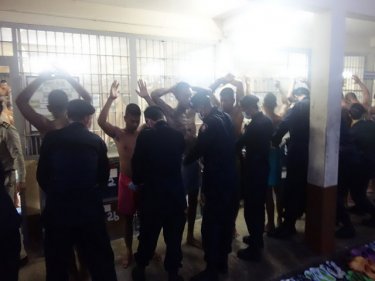






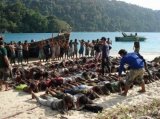


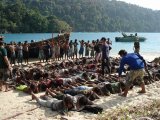

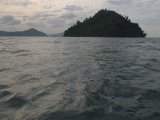

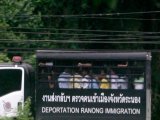

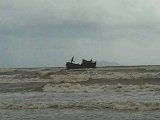

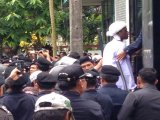
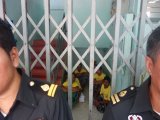






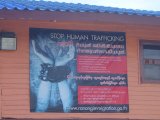




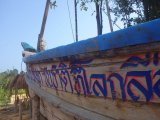

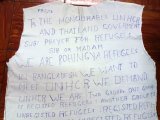


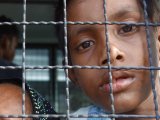





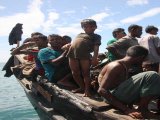
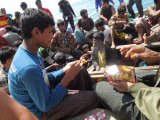



Alan, you may win "Nobel Prize 2014"...
http://www.nobelprize.org/nomination/peace/
Why Not? Thanks to Thai Navy in your case.
Posted by Whistle-Blower on December 20, 2013 17:01
Editor Comment:
We could be the only Nobel Prize candidates in Phuket Prison, WB. That would be something. Go right ahead.